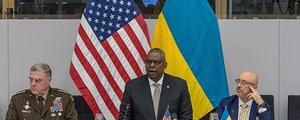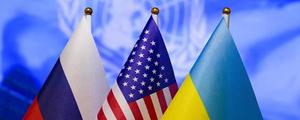Oct. 12, 2022
This is Gallup Reporter Resources, a comprehensive compilation of all Gallup findings on the issue of the day, edited by Justin McCarthy.
Not a subscriber? Sign up today.
As Ukraine continues to mount a counteroffensive to reclaim territory taken by Russia, reporting like yours is critical to the world's understanding of the ongoing war.
Gallup is here to help -- we have brand new data coming soon from Ukraine, where we polled residents on what they view as the next priorities in the war, their views on Russia and their hope for a future membership with NATO. The survey was conducted in September, with full coverage -- including the Donbas region.
Please contact mediainquiry@gallup.com if you would like embargoed copies of these new findings, which will be released in the coming weeks.
In the meantime, get up to speed on what we've learned about the situation so far.
What did we know prior to Russia's invasion of Ukraine?
Approval of Russian leadership was already low throughout most of the world.
Russia's leadership remained relatively unpopular in most parts of the world in 2021, with a global median approval rating of 33%. Though relatively low, this was an improvement from the 22% median approval rating in 2014 -- which was the last time Russia invaded Ukraine. After Crimea joined Russia, the country's global reputation slowly started to improve.
Before the invasion in late February, 12% of Ukrainians approved of Russia's leadership. Russia's nearby European neighbors in Sweden, Denmark and Lithuania were the least likely to approve of Russia's leadership; fewer than one in 10 approved.
Median approval across the mostly former Eastern bloc countries of NATO has never topped 30% since Crimea joined Russia in 2014.
Read Gallup's full Rating World Leaders report here.
Americans saw Russia as a threat and had a record-high unfavorable view of the country -- but a mostly favorable view of Ukraine.
In a poll taken just weeks before the invasion, majorities of Americans saw the military power of Russia (59%) and the conflict between Russia and Ukraine (52%) as critical threats.
Most Americans (62%) had a favorable view of Ukraine, reflecting a slight increase since 2020. Meanwhile, 85% had an unfavorable view of Russia -- by far, Russia's worst rating in over three decades of Gallup tracking.
Find Gallup's full trends on country favorable ratings here.
Americans were mixed in their views of NATO's performance.
Americans were split in February on how well the mutual defense pact was doing its job. Forty-eight percent said NATO was doing a good job, while 45% said it was doing a poor job.
Pre-invasion, a third of Americans viewed Russia as the greatest enemy to the U.S.
About one in three Americans (32%) viewed Russia as the greatest enemy to the U.S., second to China (49%).
View Gallup's full trends on critical threats and enemies here.
What have we learned since Russia's invasion of Ukraine?
Americans widely favor welcoming Ukrainian refugees into the U.S.
Seventy-eight percent of Americans say they would approve of "allowing up to 100,000" Ukrainian refugees into the U.S. This is the highest level of U.S. public support for admitting refugees that Gallup has found in its polling on various refugee situations since 1939. The prior high in support for accepting refugees in Gallup polling was in 1999, when 66% approved of receiving "several hundred ethnic Albanian refugees from Kosovo." Support for admitting Ukrainian refugees is bipartisan.
Most Americans disapprove of Joe Biden's handling of the situation in Ukraine and relations with Russia.
Forty-six percent of U.S. adults approve of the way the president is handling the situation in Ukraine -- slightly more than the percentage who approve of the way Biden is managing relations with Russia (39%).
The majority of Americans would rather see the U.S. support Ukraine in reclaiming lost territory from Russia, even if it means a prolonged war.
A majority of Americans (66%) would rather see the U.S. support Ukraine in reclaiming lost territory from Russia, even if it means a prolonged war, than see a quick end to the conflict, even if it means ceding territory to Russia (31%).
Nearly four in five Democrats, the most of any major U.S. subgroup, want the U.S. to support Ukraine in reclaiming territory. While half of Republicans agree, nearly as many Republicans (46%) would rather see a quick end to the conflict.
Meanwhile, a mixed picture emerges when Americans are asked to assess the United States' current level of support for Ukraine. The public is about equally likely to say the U.S. is not doing enough for Ukraine (38%) as to say it is doing the right amount (36%), while 24% say the U.S. is currently doing too much.
Strong majorities in Finland and Sweden approve of NATO leadership's job performance.
Few hurdles remain for Sweden and Finland to become NATO's newest members -- and there are also few hurdles among the publics in these countries, with strong majorities in Finland (81%) and Sweden (74%) approving of the alliance's leadership.
This could change depending on the outcome of the war in Ukraine. It is likely that both countries are largely positive about NATO as they see membership as a potential security guarantor against potential threats from Russia.
Read/Listen to additional analyses on the war:
Influx of Ukrainians Could Test Neighbors' Hospitality: “Many of Ukraine's western neighbors, including Hungary and Slovakia, have consistently ranked among the least accepting in the world for migrants.”
Ukraine War Threatens World's Food Supply: “Gallup data offer insight into the populations most likely to suffer from a prolonged disruption: People in countries reliant on wheat from Ukraine or Russia, where large segments of their populations were also struggling to afford food before the war broke out.”
Putin Didn't Expect a Damaging Economic Attack, NATO Unity (Gallup Podcast): George Friedman, founder of Geopolitical Futures, comes back to offer his latest assessment of the crisis in Ukraine.
75 Years of European Foreign Policy ‘Changed Overnight’ (Gallup Podcast): Ian Kelly, former U.S. ambassador to Georgia, describes Vladimir Putin's response to dissent within Russia and offers how he thinks the White House should act.
Reva Goujon on Russia: 'The Chess Pieces Were Lined Up' (Gallup Podcast): Reva Goujon joins the podcast to discuss Russia's invasion of Ukraine and the geopolitical calculus that led to it.
Go back in time with Gallup World Poll findings from Ukraine and Russia since 2005.
Historical findings from Ukraine:
- 2021: Ukraine: Few Takers for Vaccine Ahead of Surge
- 2019: World-Low 9% of Ukrainians Confident in Government
- 2019: Unpopular Russia Still Looms Large Over Ukraine Elections
- 2018: Ukrainians, Russians More Polarized on Future of Relations
- 2017: Amid Record Suffering, Economy Improving for Some Ukrainians
- 2015: Ukrainians Disillusioned With Leadership
- 2014: Ukrainian Approval of Russia's Leadership Dives Almost 90%
- 2014: Before Crisis, Ukrainians More Likely to See NATO as a Threat
- 2014: Tolerance of Different Nationalities Worse in Ukraine
- 2013: Ukrainians' Discontent Runs Deep
- 2008: Ukrainians See More Value in Ties With Russia Than U.S.
Historical findings from Russia:
- 2021: Economic Woes Add to Russians' Frustrations in the Pandemic
- 2019: Record 20% of Russians Say They Would Like to Leave Russia
- 2017: Russians Happier With Putin Than With Country's Direction
- 2016: Russians, EU Residents See Sanctions Hurting Their Economies
- 2016: Russians' Approval of U.S. Leadership Drops to Record 1%
- 2014: Russians Rely on State Media for News of Ukraine, Crimea
- 2008: Russia's Language Could Be Ticket in for Migrants
- 2008: Russians Not Sold on Free Market Economy
- 2007: Oil Spill Underscores Russians' Environmental Concerns
- 2005: Poll of Moscow: Economic Outlook Murky
The Gallup Vault: One of Gallup's earliest polling questions was about a different Soviet invasion.
More from the Gallup Vault:
- 1946: Americans' Views as the Iron Curtain Descended
- 1947: 70 Years Ago, Five Grievances Against Russia
- 1947: Telling America's Story to Russians in 1947
Keep these important resources on hand as the war in Ukraine continues.
- Gallup historical trends on Russia: This page contains U.S. public opinion trends on Russia, dating as far back as 1989. Favorability of Russia, views of Russia as an enemy, perceptions of its military as a critical threat to U.S. interests and more can be found here.
- Gallup content archives on Russia: Access Gallup content on Russia dating back to 2005, including all articles, Q&As, podcast interviews and more.
- Gallup content archives on Ukraine: Access Gallup content on Ukraine dating back to 2008, including all articles, Q&As, podcast interviews and more.
- The Global Leadership Approval Center: Since 2005, Gallup has been tracking the entire world's perceptions of the job performance of the leadership of some of the biggest players on the global stage -- the U.S., Germany, China and Russia.
- Gallup Analytics: Gallup has polled thousands of residents in Russia and Ukraine for over 15 years. Explore leading economic indicators and social and wellbeing data collected since 2005 in more than 160 countries and areas. Contact mediainquiry@gallup.com for questions and access to the platform.
Want to talk? Our experts are available to speak with you.
“Support for Ukraine remains high among NATO country publics. Gallup surveys conducted this summer show that a majority of Americans favor supporting Ukraine in reclaiming its territory. Poland, Hungary and other countries receiving a large number of Ukrainian refugees have not experienced a spike in anti-immigrant sentiment despite rising inflation and economic worries. Whether this sense of unity against a common adversary is a lasting attitude in the face of an uncertain winter remains to be seen.” -- Galina Zapryanova, Gallup's Regional Research Director for Eastern Europe and former Soviet States
“We've been tracking how Ukrainians have assessed their own lives for more than a decade -- their views of Russian leadership, assessments of their own leaders and confidence in their military. Our latest findings will provide a rare look into the situation through the eyes of Ukrainians themselves -- how they see the conflict unfolding and their hopes for the future of their country.” -- Mohamed Younis, Editor-in-Chief for Gallup News
Contact mediainquiry@gallup.com to schedule interviews with our experts.



